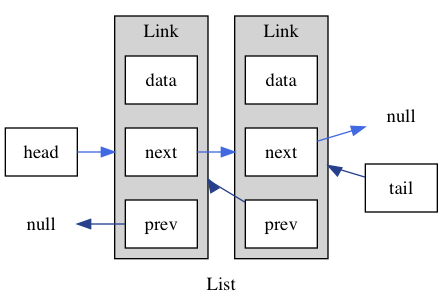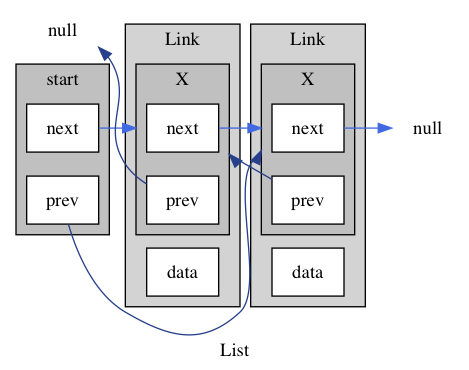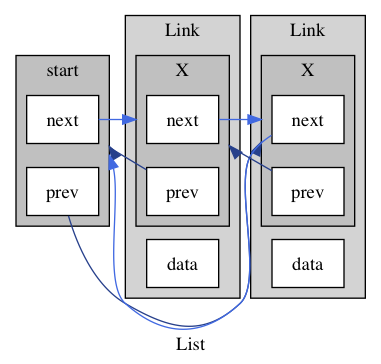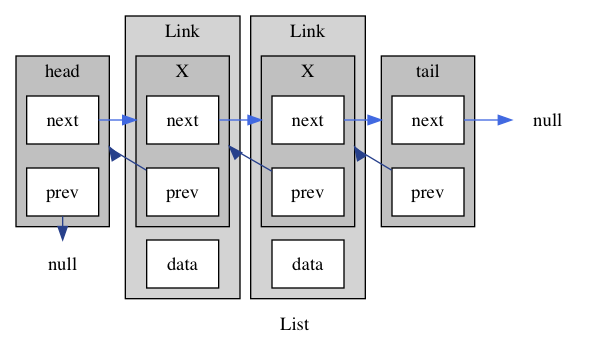This is a typical C implementation of a (doubly) linked-list.
I want to avoid passing the element and the list itself to functions which operate on and possibly modify the list; the element alone should be all I need. I separated the prev and next into it's own struct.
This is not closed; start has nothing pointing to it, so I still need to pass List.
This is closed, but it has no way to differentiate the struct List from the struct Link; not only will this go round-and-round, it will crash when I upcast start and expect Link.
This works. head and tail have a distinctive property that one of their pointers is null. I can test for this.
List.h, (C89/90,)
typedef void (*Action)(int *const);
struct X { struct X *prev, *next; };
struct Link { struct X x; int data; };
struct List { struct X head, tail; };
void ListClear(struct List *const list);
void ListPush(struct List *const list, int *const add);
void ListAddBefore(int *const data, int *const add);
void ListForEach(struct List *const list, const Action action);
List.c,
#include <stddef.h> /* offset_of */
#include "List.h"
/* Minimal example without checks. */
static struct Link *x_upcast(struct X *const x) {
return (struct Link *)(void *)((char *)x - offsetof(struct Link, x));
}
static struct Link *data_upcast(int *const data) {
return (struct Link *)(void *)((char *)data - offsetof(struct Link, data));
}
static void add_before(struct X *const x, struct X *const add) {
add->prev = x->prev;
add->next = x;
x->prev->next = add;
x->prev = add;
}
static void clear(struct List *const list) {
list->head.prev = list->tail.next = 0;
list->head.next = &list->tail;
list->tail.prev = &list->head;
}
/** Clears and removes all values from {list}, thereby initialising the {List}.
All previous values are un-associated. */
void ListClear(struct List *const list) {
if(!list) return;
clear(list);
}
/** Initialises the contents of the node which contains {add} to add it to the
end of {list}. */
void ListPush(struct List *const list, int *const add) {
if(!list || !add) return;
add_before(&list->tail, &(data_upcast)(add)->x);
}
/** Initialises the contents of the node which contains {add} to add it
immediately before {data}. */
void ListAddBefore(int *const data, int *const add) {
if(!data || !add) return;
add_before(&data_upcast(data)->x, &data_upcast(add)->x);
}
/** Performs {action} for each element in {list} in the order specified. */
void ListForEach(struct List *const list, const Action action) {
struct X *x, *next_x;
if(!list || !action) return;
for(x = list->head.next; (next_x = x->next); x = next_x)
action(&(x_upcast)(x)->data);
}
Use this as,
#include <stdio.h> /* printf */
#include <stdlib.h> /* EXIT_ */
#include <errno.h>
#include "List.h"
/* Very basic fixed capacity; returns null after full. */
static struct Link links[20];
static const size_t links_no = sizeof links / sizeof *links;
static size_t links_used;
static int *get_link(const int data) {
struct Link *link;
if(links_used >= links_no) { errno = ERANGE; return 0; }
link = links + links_used++;
link->data = data;
return &link->data;
}
static void sub_ten(int *const i) { ListAddBefore(i, get_link(*i - 10)); }
static void show(int *const i) { printf("%d.\n", *i); }
static struct List list;
int main(void) {
size_t i;
ListClear(&list);
/* Create 10 nodes, [1, 10]. */
for(i = 0; i < 10; i++) ListPush(&list, get_link(links_used + 1));
/* Creates a copy of all the data minus ten. */
ListForEach(&list, &sub_ten);
/* Prints. */
ListForEach(&list, &show);
return errno ? perror("ints"), EXIT_FAILURE : EXIT_SUCCESS;
}
Prints,
-9.
1.
-8.
2.
-7.
3.
-6.
4.
-5.
5.
-4.
6.
-3.
7.
-2.
8.
-1.
9.
0.
10.
(If you go above the fixed number of elements, it will print an error.)
Do I really need four pointers in List to call it on Link alone? If I wanted to add the valid static initial state, I would have to branch each time I iterate on null/not-null. Further, how would I deal with two equivalent states, that is, head.next = tail.prev = null and head.next = tail; tail.prev = head, in the most robust way possible? Is it possible to initialise List statically?




